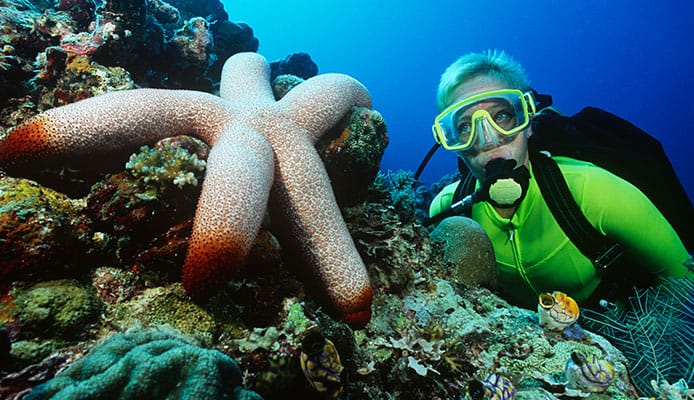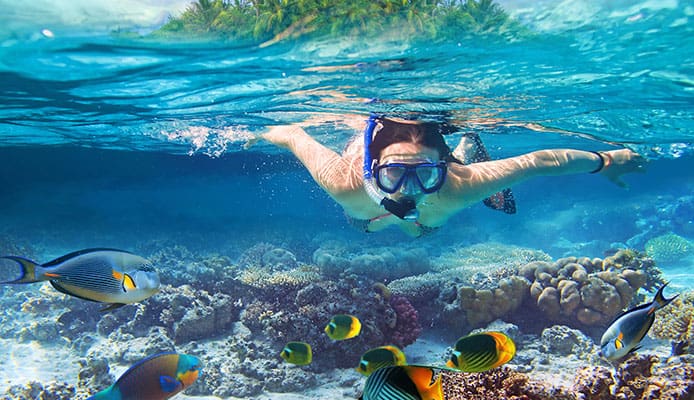
When you first learn how to scuba dive, you will be taught about the different diving theory and concepts to help you become a better diver. However, some beginning divers, as well as those who are on their second or third dives, tend to forget about them which then puts their safety at risk. That said, here are ten diving concepts to always keep in mind to ensure a fun and safe diving adventure.
Pre-dive Check
The pre-dive check is an important step and one that will be taught to you on your first open water dive. Here, you will go over your scuba diving gear together with your diving buddy and ensure that everything is in order, from your buoyancy compensator device (BCD) to the amount of air in your scuba tank and more. This step becomes even more crucial if your gear has been set up by somebody else. By doing this final inspection of your dive equipment, you add another layer of safety to your diving adventure.
Hand Signals
Good communication is essential to having an enjoyable and safe diving adventure, and while diving your only medium of communication would be through hand signals. Scuba diving hand signals are used to communicate intentions (e.g. asking if your diving buddy is okay) or give directions such as whether to go up or down. Several hand signals are generally accepted among divers all over the world, and though knowing all of them can certainly be fun, having a good grasp of the basic hand signals and being able to properly execute them is usually sufficient to ensure good communication between you and your diving buddy (and other divers in your group).
Dive Plan
A dive plan is necessary to ensure a safe and enjoyable time underwater. This plan outlines the maximum time you can stay underwater and the depth at which you can dive. It should also include emergency and lost-diver procedures, underwater signaling device usage, and exploration routes among other things. Creating a dive plan should be done for every dive (you can’t use the dive plan you made for a previous dive) and will vary from one diving spot to another and depend upon the specifics of the dive.
Rule of Thirds
The rule of thirds does not only apply to taking photographs with your diving camera (that being a whole different concept altogether), but also to air-supply management. Based on this rule, you should assign a third of your air supply for the outward journey, the other third for the return journey, and the final third as a safety reserve. Don’t forget to leave enough margin for a slow ascent and safety stops as well. Also, keep in mind that when diving against strong currents and in cold waters your air consumption may accelerate significantly.
Dive within Your Limits
Scuba diving is an exciting sport, and it sometimes happens that many beginning divers tend to overestimate their limits and go on dives that put them in an uncomfortable and dangerous situation. That said, know your limits and plan your dive with those limits in mind. Don’t attempt to take deep dives, shipwreck diving, and cave explorations unless you have undergone the necessary training and have a few open water diving experiences under your belt.
Breathe Continuously
One of the first things that every beginning diver learns is to never hold their breath underwater as this can result in serious injuries and some cases death. According to Boyle’s Law, the air in a diver’s lungs expands during ascent and contracts during descent. When divers hold their breath, the air isn’t able to escape as it expands. Even depth changes of just a few feet are enough to cause over-expansion of the lungs. These can result in pulmonary barotrauma, arterial gas embolism, and other health risks. To keep these things from happening, you simply have to breathe continuously to allow the expanding air molecules to escape from your lungs.
Ascend Safely
Divers are taught to always ascend slowly for safety reasons. If the diver ascends too fast, the nitrogen in your bloodstream will not be able to dissolve as you go back to the surface. Bubbles will also begin to form in your bloodstream which will ultimately lead to decompression sickness. You should also monitor your dive computer while you ascend since this will tell you whether you’re ascending too quickly.
Equalize
When underwater, the external pressure surrounding you will make it difficult for your ears to adjust accordingly. Also, the pressure exerted by the watery environment can change rapidly as you go deeper. When this happens, it can result in an uncomfortable and painful sensation in your ears. This is why it is important to learn how to equalize to avoid these issues.
Steer Clear of Alcohol before Diving
It can be tempting to go for a round of beers or margaritas during a dive holiday in the tropics. However, it is never a good idea to flood your body with alcohol before a dive. For one, this will leave you feeling intoxicated (even after several hours after your last bottle) which can then cloud your judgment during emergencies. Second, consuming alcohol will have negative effects on your body like dehydration, reduced blood circulation, and increased heart rate. This then increases the risk of the nitrogen turning into the gaseous state of tiny bubbles which can lead to decompression sickness.
You might also like: Diving With Moray Eels
Don’t Touch Marine Life
The underwater world is fascinating and is filled with lots of wonderful creatures. Although some divers are content to simply take snapshots of marine flora and fauna with their underwater cameras and underwater strobes, some divers can’t help but do more like tapping the back of a turtle’s shell or poking colorful corals. However, this is strongly advised against since doing so can harm wildlife and even pose some safety hazards for the diver.
Globo Surf Overview
There are plenty of other diving concepts and diving theory that every diver needs to be familiar with. If you are planning to make scuba diving a lifelong hobby, then you’ll need to spend some time learning them and more importantly applying them to your every dive.
More Scuba Reviews:
- Dive Watches Under 500
- Ladies Dive Watch
- Underwater Scooter
- Scuba Regulator
- Rebreather
- Cressi Giotto
- Aqualung I300
- Citizen Bm8180-03e


